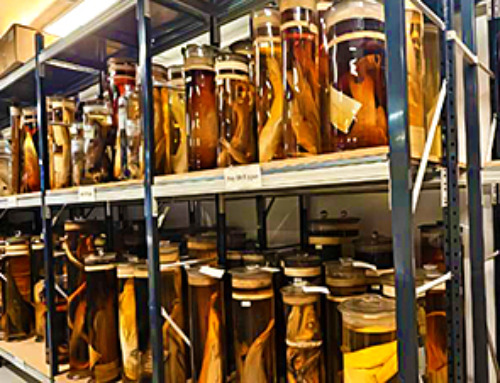The internet search engine of the future will be powered by artificial intelligence. One can already choose from a host of AI-powered or AI-enhanced search engines—though their reliability often still leaves much to be desired. However, a team of computer scientists at the University of Massachusetts Amherst recently published and released a novel system for evaluating the reliability of AI-generated searches.
Called “eRAG,” the method is a way of putting the AI and search engine in conversation with each other, then evaluating the quality of search engines for AI use. The work is published as part of the Proceedings of the 47th International ACM SIGIR Conference on Research and Development in Information Retrieval.
“All of the search engines that we’ve always used were designed for humans,” says Alireza Salemi, a graduate student in the Manning College of Information and Computer Sciences at UMass Amherst and the paper’s lead author.
“They work pretty well when the user is a human, but the search engine of the future’s main user will be one of the AI Large Language Models (LLMs), like ChatGPT. This means that we need to completely redesign the way that search engines work, and my research explores how LLMs and search engines can learn from each other.”
The basic problem that Salemi and the senior author of the research, Hamed Zamani, associate professor of information and computer sciences at UMass Amherst, confront is that humans and LLMs have very different informational needs and consumption behavior.
For instance, if you can’t quite remember the title and author of that new book that was just published, you can enter a series of general search terms, such as, “what is the new spy novel with an environmental twist by that famous writer,” and then narrow the results down, or run another search as you remember more information (the author is a woman who wrote the novel “Flamethrowers”), until you find the correct result (“Creation Lake” by Rachel Kushner—which Google returned as the third hit after following the process above).
But that’s how humans work, not LLMs. They are trained on specific, enormous sets of data, and anything that is not in that data set—like the new book that just hit the stands—is effectively invisible to the LLM.
Furthermore, they’re not particularly reliable with hazy requests, because the LLM needs to be able to ask the engine for more information; but to do so, it needs to know the correct additional information to ask.
Computer scientists have devised a way to help LLMs evaluate and choose the information they need, called “retrieval-augmented generation,” or RAG. RAG is a way of augmenting LLMs with the result lists produced by search engines. But of course, the question is, how to evaluate how useful the retrieval results are for the LLMs?
So far, researchers have come up with three main ways to do this: the first is to crowdsource the accuracy of the relevance judgments with a group of humans. However, it’s a very costly method and humans may not have the same sense of relevance as an LLM.
One can also have an LLM generate a relevance judgment, which is far cheaper, but the accuracy suffers unless one has access to one of the most powerful LLM models. The third way, which is the gold standard, is to evaluate the end-to-end performance of retrieval-augmented LLMs.
But even this third method has its drawbacks. “It’s very expensive,” says Salemi, “and there are some concerning transparency issues. We don’t know how the LLM arrived at its results; we just know that it either did or didn’t.” Furthermore, there are a few dozen LLMs in existence right now, and each of them work in different ways, returning different answers.
Instead, Salemi and Zamani have developed eRAG, which is similar to the gold-standard method, but far more cost-effective, up to three times faster, uses 50 times less GPU power and is nearly as reliable.
“The first step towards developing effective search engines for AI agents is to accurately evaluate them,” says Zamani. “eRAG provides a reliable, relatively efficient and effective evaluation methodology for search engines that are being used by AI agents.”
In brief, eRAG works like this: a human user uses an LLM-powered AI agent to accomplish a task. The AI agent will submit a query to a search engine and the search engine will return a discrete number of results—say, 50—for LLM consumption.
eRAG runs each of the 50 documents through the LLM to find out which specific document the LLM found useful for generating the correct output. These document-level scores are then aggregated for evaluating the search engine quality for the AI agent.
While there is currently no search engine that can work with all the major LLMs that have been developed, the accuracy, cost-effectiveness and ease with which eRAG can be implemented is a major step toward the day when all our search engines run on AI.
This research has been awarded a Best Short Paper Award by the Association for Computing Machinery’s International Conference on Research and Development in Information Retrieval (SIGIR 2024). A public python package, containing the code for eRAG, is available at https://github.com/alirezasalemi7/eRAG.
More information: Alireza Salemi et al, Evaluating Retrieval Quality in Retrieval-Augmented Generation, Proceedings of the 47th International ACM SIGIR Conference on Research and Development in Information Retrieval (2024). DOI: 10.1145/3626772.3657957
News
Analyzing Darwin’s specimens without opening 200-year-old jars
Scientists have successfully analyzed Charles Darwin's original specimens from his HMS Beagle voyage (1831 to 1836) to the Galapagos Islands. Remarkably, the specimens have been analyzed without opening their 200-year-old preservation jars. Examining 46 [...]
Scientists discover natural ‘brake’ that could stop harmful inflammation
Researchers at University College London (UCL) have uncovered a key mechanism that helps the body switch off inflammation—a breakthrough that could lead to new treatments for chronic diseases affecting millions worldwide. Inflammation is the [...]
A Forgotten Molecule Could Revive Failing Antifungal Drugs and Save Millions of Lives
Scientists have uncovered a way to make existing antifungal drugs work again against deadly, drug-resistant fungi. Fungal infections claim millions of lives worldwide each year, and current medical treatments are failing to keep pace. [...]
Scientists Trap Thyme’s Healing Power in Tiny Capsules
A new micro-encapsulation breakthrough could turn thyme’s powerful health benefits into safer, smarter nanodoses. Thyme extract is often praised for its wide range of health benefits, giving it a reputation as a natural medicinal [...]
Scientists Develop Spray-On Powder That Instantly Seals Life-Threatening Wounds
KAIST scientists have created a fast-acting, stable powder hemostat that stops bleeding in one second and could significantly improve survival in combat and emergency medicine. Severe blood loss remains the primary cause of death from [...]
Oceans Are Struggling To Absorb Carbon As Microplastics Flood Their Waters
New research points to an unexpected way plastic pollution may be influencing Earth’s climate system. A recent study suggests that microscopic plastic pollution is reducing the ocean’s capacity to take in carbon dioxide, a [...]
Molecular Manufacturing: The Future of Nanomedicine – New book from Frank Boehm
This book explores the revolutionary potential of atomically precise manufacturing technologies to transform global healthcare, as well as practically every other sector across society. This forward-thinking volume examines how envisaged Factory@Home systems might enable the cost-effective [...]
New Book! NanoMedical Brain/Cloud Interface – Explorations and Implications
New book from Frank Boehm, NanoappsMedical Inc Founder: This book explores the future hypothetical possibility that the cerebral cortex of the human brain might be seamlessly, safely, and securely connected with the Cloud via [...]
Global Health Care Equivalency in the Age of Nanotechnology, Nanomedicine and Artificial Intelligence
A new book by Frank Boehm, NanoappsMedical Inc. Founder. This groundbreaking volume explores the vision of a Global Health Care Equivalency (GHCE) system powered by artificial intelligence and quantum computing technologies, operating on secure [...]
Miller School Researchers Pioneer Nanovanilloid-Based Brain Cooling for Traumatic Injury
A multidisciplinary team at the University of Miami Miller School of Medicine has developed a breakthrough nanodrug platform that may prove beneficial for rapid, targeted therapeutic hypothermia after traumatic brain injury (TBI). Their work, published in ACS [...]
COVID-19 still claims more than 100,000 US lives each year
Centers for Disease Control and Prevention researchers report national estimates of 43.6 million COVID-19-associated illnesses and 101,300 deaths in the US during October 2022 to September 2023, plus 33.0 million illnesses and 100,800 deaths [...]
Nanomedicine in 2026: Experts Predict the Year Ahead
Progress in nanomedicine is almost as fast as the science is small. Over the last year, we've seen an abundance of headlines covering medical R&D at the nanoscale: polymer-coated nanoparticles targeting ovarian cancer, Albumin recruiting nanoparticles for [...]
Lipid nanoparticles could unlock access for millions of autoimmune patients
Capstan Therapeutics scientists demonstrate that lipid nanoparticles can engineer CAR T cells within the body without laboratory cell manufacturing and ex vivo expansion. The method using targeted lipid nanoparticles (tLNPs) is designed to deliver [...]
The Brain’s Strange Way of Computing Could Explain Consciousness
Consciousness may emerge not from code, but from the way living brains physically compute. Discussions about consciousness often stall between two deeply rooted viewpoints. One is computational functionalism, which holds that cognition can be [...]
First breathing ‘lung-on-chip’ developed using genetically identical cells
Researchers at the Francis Crick Institute and AlveoliX have developed the first human lung-on-chip model using stem cells taken from only one person. These chips simulate breathing motions and lung disease in an individual, [...]
Cell Membranes May Act Like Tiny Power Generators
Living cells may generate electricity through the natural motion of their membranes. These fast electrical signals could play a role in how cells communicate and sense their surroundings. Scientists have proposed a new theoretical [...]





















